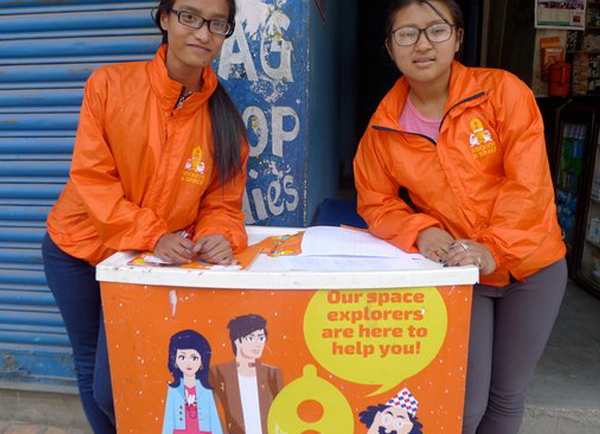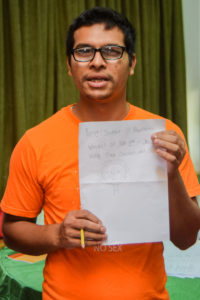Rockets and Space featured in The Guardian

Sex education lifts off as Nepal launches mission to get message to young people
Which contraceptive protects you against pregnancy and sexually transmitted diseases?” In a flurry, the group of young people crowded into a room in the Marie Stopes centre in Kathmandu grab cards on which “condom” is written, and shout out their answers. There’ll be a prize for the quickest and the loudest.
It’s a warm Saturday morning in the Putalisadak district of Nepal’s capital, and the young men and women are attending a sex education class – part of a three-year programme, funded by Australian aid, to get young people talking about sex.
The programme is called Rockets and Space – rocket representing the penis, space the vagina – and its message, carved out in bright orange and yellow letters on notebooks, keyrings and T-shirts, is being promoted by a band of youth volunteers through sessions at youth space stations, based in four of Marie Stopes’s 36 centres in Nepal, and visits to schools and communities. The volunteers also set up stalls along streets and in busy centres, handing out leaflets and condoms that are wrapped in card with illustrations of different sexual positions.
Cartoon characters, including a scientist and myth-busting “astronuts”, are used to communicate facts about safe sex and discuss topics such as masturbation, menstruation and wet dreams.
The programme has a Facebook page, which has attracted more than 100,000 likes, and a website is due to be launched this month.
Deepa Pradhan, one of the volunteers, says using games to engage young people reduces the embarrassment of talking about what are still taboo subjects in Nepal, and helps keep the interest of those listening.
“Games make them see [sex education] is really important and helps them keep these things in mind,” says Pradhan, a social work graduate who has been working with Marie Stopes for two years. “Lecturing makes young people bored. They are not interested in lectures or presentations.
“I really enjoy my job. I give young people information that they might not want to talk about, but [which] they really need. It’s very important for the youth, as our society doesn’t allow us to talk about sexual health openly.”
Rahul Thapamagar, another volunteer at the centre, adds: “We want to help them sort out their problems so that they won’t be harmful to their futures.”
The 22-year-old business studies graduate admits that at first he felt embarrassed talking about sex but, after some training, he now “feels more comfortable to talk with them about these topics”.
Thapamagar says that while sex education is taught at Nepalese schools, what is covered, and the quality of the information, varies widely – a trend found across the world.
In May, the International Planned Parenthood Federation said sex education globally was “too little, too late and too biological”, and called for more fundingfor services to give the world’s 1.8 billion 10- to 24-year-olds better information.
Nepal had the third-highest teenage pregnancy rate in south Asia in 2014, according to World Bank figures, with 73 births per 1,000 women aged 15 to 19. Of the 15- to 19-year-old girls who are already married (almost 30%), an estimated 17% have at least one child and 86% are thought not to use any modern contraception.
Last month, the ministry of health held the country’s first national conference on adolescent health and development, which brought together government officials, NGOs, academics, UN agencies and representatives from the private sector to share ideas to reduce the numbers and hit internationally agreed targets on universal access to sexual and reproductive healthcare services, including information and education.
The government has already proposed scaling up its family planning services over the next five years. Government figures (pdf) show that 25% of people who want to use contraceptives are unable to access services. Only about 52% of married or cohabiting women between the ages of 15 and 49 use family planning in Nepal,according to the UN.
“In Nepal, if you approach young people about family planning, they hesitate to talk about it. They think they don’t need to think about it,” says Shreejana Bajracharya, senior communications consultant at Marie Stopes Nepal.
She says the Rockets and Space programme was designed with the input of young people and complements a free helpline, set up in 2011, and a weekly radio show that both offer sex and relationship advice. “We asked young people what they wanted and designed it for them,” she says.
Bajracharya hopes that as well as promoting safe sex, the programme will help Marie Stopes shed the image that it only offers abortion services, which is a barrier to people coming to its centres. “People think Marie Stopes is just for safe abortion. They don’t know we provide family planning services.”

